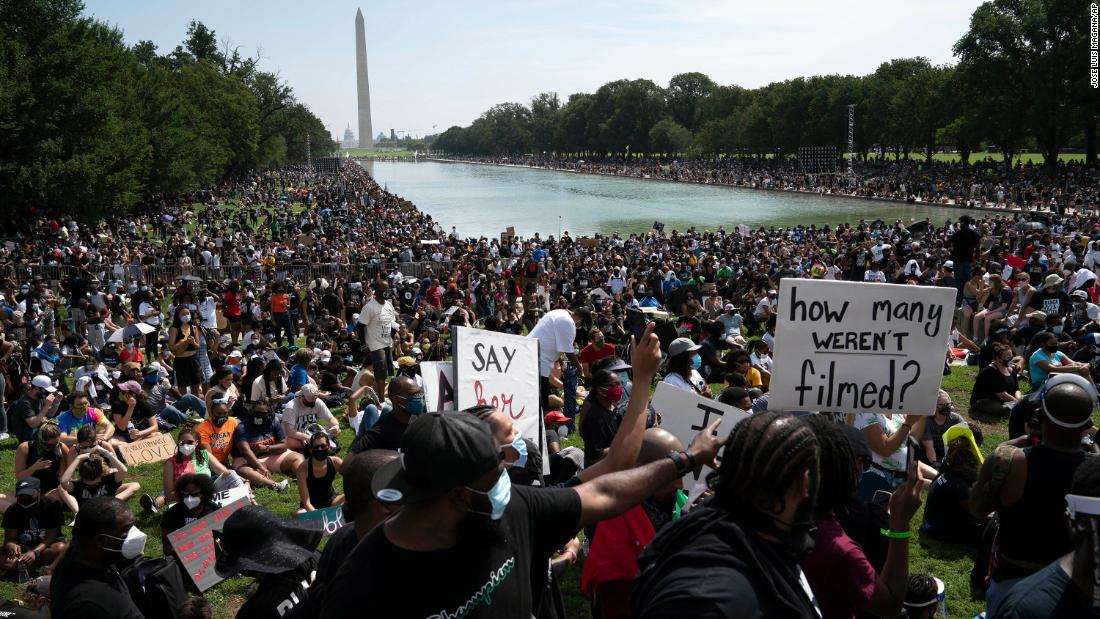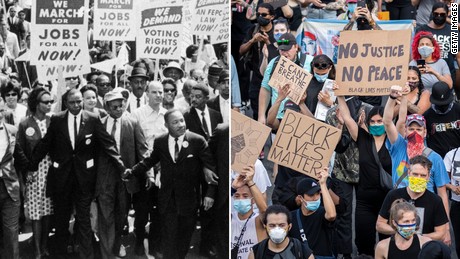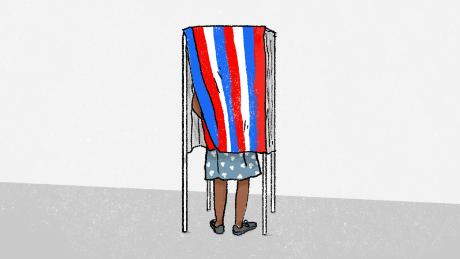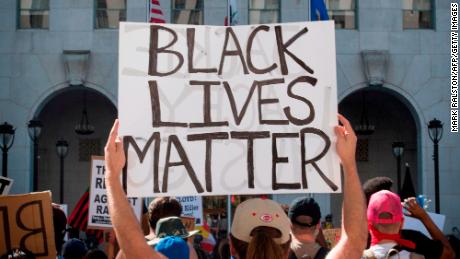The event follows a summer that has seen a global outcry over police brutality and comes just days after another Black father was shot by law enforcement
“We will meet the moment. We will work toward healing (and) justice … like our lives depend on it, because they do,” US Rep. Ayanna Pressley, D-Massachusetts, told crowds late Friday morning.
“Let me make it plain: Black lives matter!” Pressley said.
“We want an America that will stomp out the divisiveness, the intimidation and the threat. We want a White House who stands as a healer in chief, who understands black mothers’ pain,” Rep. Sheila Jackson Lee, D-Texas, told the crowd.

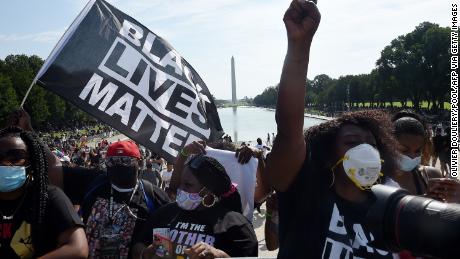
Demonstrators gather outside the Lincoln Memorial for Friday’s march.
Organizers have stressed that the march will comply with health guidance and local ordinances. Face masks are required to march, and masks, gloves and hand sanitizer will be provided on site.
The bill — titled the George Floyd Justice in Policing Act of 2020 — would overhaul qualified immunity for law enforcement, prohibit no-knock warrants in federal drug cases, ban chokeholds at the federal level and establish a national registry of police misconduct, among other provisions.
‘It’s a huge moment for us as a people’
“Fifty-seven years ago, they were here marching on Washington for just equality as a people. Right now, I think this march is about survival,” the man, who gave his name only as Bubba, said.
“There’s no waiting for us to vote. We shouldn’t have to wait for that. That should happen today, to where we shouldn’t have to be out worried about our kids … without having to worry about getting a phone call that they have been shot or killed, especially by police that supposed to protect us,” he said.
Ahead of the main program, recorded messages were played on large screens in front of the memorial, in which speakers called for people to vote and, as one speaker said, “to make those who are comfortable with our oppression uncomfortable.”

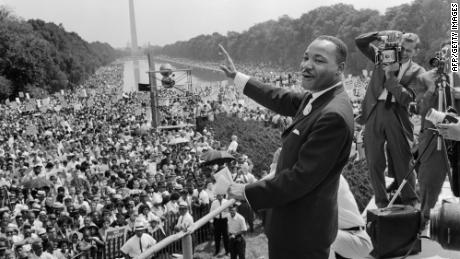
Martin Luther King waves to supporters during the 1963 March on Washington.
Martin Luther King III: ‘Dad would be very proud’
Martin Luther King III is expected to be among Friday’s speakers.
“Dad would be very proud that people are coming together to stand up against injustice,” King told CNN. “But certainly very sad that we’re still attempting to get justice.”

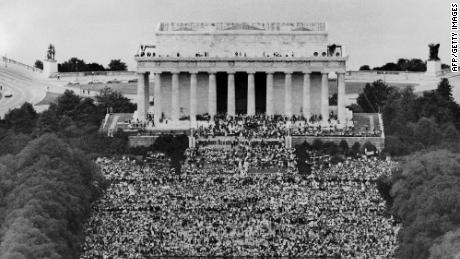
Hundreds of thousands of people gather for the March on Washington for Jobs and Freedom at the Lincoln Memorial on August 28, 1963.
Adding to the urgency for organizers is the November election, the lead-up to which has been marked by a divisive presidential campaign.
“We are on the way to a resolution, I believe, because the consciousness is awakened,” King said. “I don’t think these young people are going to stop. I think they’re going to continue to demand justice.”
Activists are demanding police reform
The march would be led by families that “know the pain” and know what it’s like to be “neglected,” Sharpton said Floyd’s service in June..

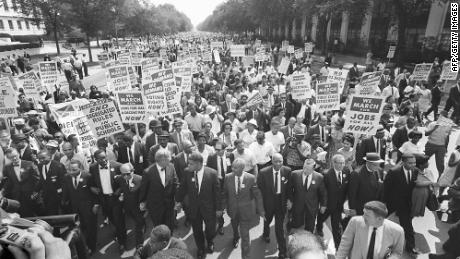
Dr. Martin Luther King Jr, third from left, and other civil right leaders lead the 1963 March on Washington.
That demand for police accountability is a priority King said his father would be focusing on today, were he still alive.
“Dad wanted to essentially eradicate what he called the triple evils of poverty, racism and he said ‘militarism,'” King told CNN before the march. “I have sort of changed it to violence: poverty, racism and violence.”
Marchers are evoking spirit of John Lewis
Friday’s march will also honor the late civil rights icon and congressman John Lewis, who spent his life fighting for voting rights.
At 23, Lewis was one of the youngest keynote speakers at original march in 1963. He was also its last surviving speaker.
“We’re walking in the spirit of Dr. King but also in the spirit of John Lewis to make ‘good trouble,'” Tylik McMillan, the national director of youth and college for Sharpton’s National Action Network (NAN), told CNN last week.
NAN is also encouraging attendees to fill out the 2020 US Census, register to vote, and sign up to be poll workers and monitors.
How the march will go
Demonstrators gathered at the Lincoln Memorial for the day’s programming before marching to the Martin Luther King Jr. Memorial.
The application for the march estimated around 100,000 attendees, but the National Parks Service said it believes the number will be about half that. Local officials also said that attendance would be scaled back.

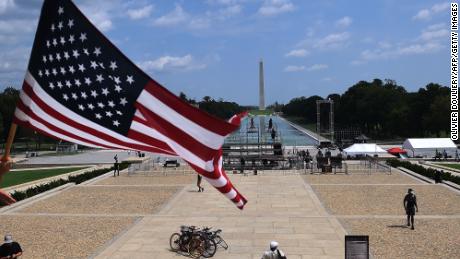
A man waves an American flag on top of the Lincoln Memorial ahead of the 2020 March on Washington.
“It’s not a big march that was initially envisioned, but a seated event where the number of seats would be limited,” Washington Mayor Muriel Bowser said on Monday.
Organizers have stressed that the march will comply with health guidance and local ordinances. Face masks are required to march, and masks, gloves and hand sanitizer will be provided on site.
The Black National Convention will follow
Months before Sharpton announced this year’s march, the Movement For Black Lives (M4BL) — a coalition of progressive Black organizations — was already at work planning another gathering: the Black National Convention.
The event was envisioned as a space where progressive Black organizers could engage outside of the major political parties and discuss policy solutions “without giving up their radical beliefs and values,” said Jessica Byrd, co-founder of the Electoral Justice Project of M4BL.
“Black people have been saying for literal decades that we want a meaningful place inside of the national political dialogue, and meaningful means specific public policy solutions that meet the height of the need and the height of the problem,” Byrd told CNN. “We have yet to have it in this country, on any side.”
M4BL supports several policy positions that are more radical than the ones organizers of Friday’s march are currently demanding. Among them is the Breathe Act, which would divest federal resources from police and invest them into healthcare, alternative community safety solutions and other sectors.
But while there may be some generational differences between the march and the Black National Convention, Byrd said the packed day of events is a sign of the political moment we are in.
“As Al Sharpton announced the march, we immediately thought, ‘Well, it’s going to be the best, Blackest political weekend to end this Freedom Summer,'” Byrd told CNN. “And that’s a good thing for all of us, and in particular, Black voters.”
Tragedy can be a bridge for change
August 28 also marks a more somber occasion.

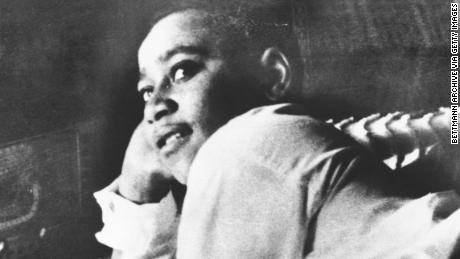
Emmett Till is shown lying on his bed.
The 14-year-old was kidnapped and brutally murdered in Mississippi in 1955 after being falsely accused of making advances at a White woman.
Horrified at the state of her son’s body when it was returned to her, Mamie Till-Mobely demanded that Emmett have an open casket funeral. Tens of thousands witnessed his injuries, and images of Emmett’s swollen and disfigured face were published for the world to see.
Decades later, Black people continue to face violence and injustice. The tragedies, past and present, are a persistent reminder of the change this moment demands, said Till’s cousin Deborah Watts.
“We still need to continue to fight,” Watts said. “We still need to continue to raise our voices, and to be very specific about what it is that we want to have changed.”
CNN’s Suzanne Malveaux, Veronica Stracqualursi, Eliott C. McLaughlin and Emanuella Grinberg contributed to this report.
![]()


